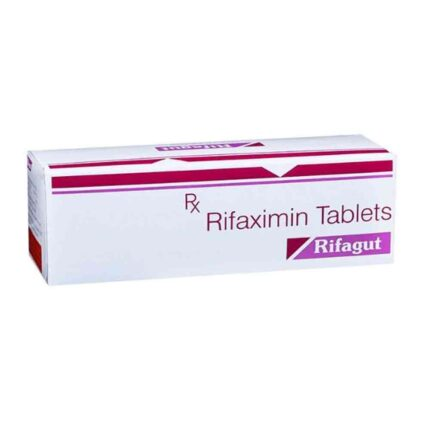What is Rifaximin?
Rifaximin 200mg is an antibiotic used to treat a variety of bacterial infections in the gastrointestinal system, including traveler’s diarrhea and irritable bowel syndrome with diarrhea (IBS-D). Rifaximin works differently than most other antibiotics and has several distinguishing properties.
Understanding Antibiotics
Antibiotics are medications that kill or inhibit the growth of germs. They are an indispensable tool in modern medicine, having saved many lives since their discovery. However, not all antibiotics act in the same manner, and their effectiveness and side effects may differ.
1. Mechanism of Action
Rifaximin’s mode of action differs significantly from that of other antibiotics. Rifaximin is a rifamycin-class antibiotic that inhibits bacterial RNA production. This implies it inhibits the creation of RNA, a critical component of bacterial cells, stopping bacteria from proliferating and causing infection.
2. Selective Action
Another important feature of Rifaximin is its specific effect on the gastrointestinal tract. Rifaximin, unlike many antibiotics, is poorly absorbed when taken orally and thus targets bacteria specifically in the stomach. This selective action helps to prevent systemic adverse effects and the likelihood of antibiotic resistance.
3. Minimal Systemic Absorption
Because Rifaximin is poorly absorbed in the bloodstream, it has little effect on the body. This implies that it is less likely to trigger allergic reactions or alter the normal bacterial balance in other parts of the body. Furthermore, because it is not substantially metabolized by the liver, Rifaximin has a lower risk of medication interactions than other antibiotics.
4. Low Risk of Antibiotic Resistance
Antibiotic resistance is an increasing global concern, as bacteria adapt and gain resistance to routinely used medicines. One advantage of Rifaximin is its minimal risk of causing antibiotic resistance. Rifaximin exerts minimal pressure on germs in other regions of the body due to its low absorption and selective action in the gastrointestinal system, minimizing the probability of resistance development.
5. Treatment of Specific Conditions
Rifaximin is generally used to treat bacterial infections of the digestive system, notably those associated with traveler’s diarrhea and IBS-D. In these cases, Rifaximin targets pathogenic bacteria in the gut while protecting good bacteria, thereby aiding in the restoration of the intestinal microbiota’s natural balance.
6. Safety Profile
Overall, Rifaximin has a better safety profile than many other antibiotics. Clinical trials have found that it is generally well tolerated, with few significant side effects documented. Rifaximin can cause abdominal pain, nausea, and headaches, but symptoms are usually moderate and transitory.
What Makes Rifaximin Special?
Rifaximin is not your typical antibiotic. It stands out from the visit in several ways. Let’s look into what distinguishes Rifaximin from other antibiotics and why it’s commonly used to treat certain diseases.
Understanding Antibiotics
First, let us define what antibiotics are all about. They are potent medications used to treat bacterial infections. When bacteria invade our bodies and create infections, antibiotics help by killing or inhibiting the growth of these harmful germs.
1. How Rifaximin Works
Rifaximin belongs to the antibiotic family known as rifamycins. Rifaximin differs from many other antibiotics in that it kills germs indirectly rather than directly. It inhibits the bacteria’s capacity to produce RNA, which is essential for their survival. By doing so, Rifaximin prevents germs from growing and effectively ends the infection.
2. Targeting the Gut
Rifaximin has a particular affinity for the gut, which is one of its most intriguing features. When taken orally (by mouth), Rifaximin is not as well absorbed into the bloodstream as other antibiotics. Instead, it stays primarily in the gut, where it is most required.
3. Bye-Bye Side Effects
Rifaximin has less adverse effects than other antibiotics since it is mostly found in the gut and does not travel far throughout the body. This means that taking Rifaximin reduces your chances of having allergic reactions or an upset stomach.
4. Staying Power in the Gut
This is effective not only at killing undesirable bacteria, but it also has a long half-life in the stomach. It , despite not being well absorb into the bloodstream, can remain in the gut for an extended period of time, continuing combating those troublesome bacteria.
5. The Gut-Friendly Antibiotic
Our gut contains millions of bacteria, both beneficial and bad. Antibiotics can sometimes destroy both beneficial and bad bacteria, causing stomach distress and other problems. However, It is different. It exclusively kills bad germs, leaving the good alone. This promotes a healthy balance of bacteria in the stomach.
6. No Resistance Allowed
You may have heard of antibiotic resistance, which occurs when bacteria develop resistance to antibiotics over time. It’s a major problem! But, guess what? When it comes to antibiotic resistance, rifaximin is the antibacterial superhero. Because it remains primarily in the gut and is not readily absorb elsewhere, it does not put as much pressure on bacteria to evolve resistance.
7. Tackling Tricky Conditions
Now, let’s look at why Rifaximin is commonly utilize. It’s a go-to treatment for traveler’s diarrhea and irritable bowel syndrome with diarrhea (IBS-D). In these circumstances, there is frequently an invasion of harmful bacteria in the stomach, which causes a variety of problems. Rifaximin saves the day by eliminating harmful bacteria and restoring gut equilibrium.
8. Feeling Safe and Sound
Last but not least, Rifaximin is a somewhat safe option. According to studies, most people tolerate it well, with only a few minor adverse effects recorded on occasion, such as stomach cramps or headaches. It is equally safe for children and the elderly to use.
In Conclusion
Rifaximin may not wear a cape, but it is a superhero among antibiotics. This, with its unique ability to target the gut, reduce side effects, and combat infections, is a game changer for many people suffering from bacterial gut disorders. If you ever need a gentle yet efficient antibiotic, it could be the one for you! Always with your doctor or healthcare professional before taking any new medicine. This is a distinct antibiotic drug with various distinguishing features that set it different from other antibiotics. Its selective action in the gastrointestinal tract, low systemic absorption, low risk of antibiotic resistance, and excellent safety profile make it an effective and well-tolerated treatment for bacterial infections in the stomach. If you have any questions or concerns about this medicine or its use, talk to your doctor.




